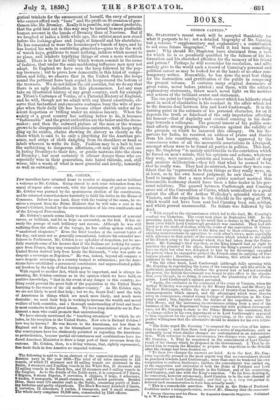AIR. COBDEN.
FEW travellers have returned home to receive so singular and so brilliant a welcome as Mr. Cobden. Going abroad to seek some relaxation from the ennui of repose after overwork, with the interruption of private Borrows, Mr. Cobden was pursued by the spontaneous election of his constituents, and he returned somewhat more hurriedly to fulfil his duties in the House of Commons. Before he can land, dizzy with the tossing of the ocean, he re- ceives a request from the Prime Minister that he will take a seat in the Queen's Cabinet, backed by the recommendation of his own eontituents and of the Liverpool Free-traders.
Mr. Cobden's speech seems likely to mark the commencement of a second career, as brilliant, and let us hope as successful, as the first. It has al- ready the presage of such brilliancy and success. Although he was still suffering from the effects of the voyage, he has seldom spoken with such "unadorned eloquence." Even the brief touches at tho current topics of the day, and some not so generally remembered, indicate his extended use- fulness in Parliament. Mr. Cobden is no upholder of despotism, yet he use- fully reminds some of his hearers that if the Italians are looking for assist- ance from France, they may remember that the constitutional people of the United States derived help from Louis the Sixteenth, "who was quite as despotic a sovereign as Napoleon." He was, indeed, beyond all compare a more despotic sovereign, in a country trained to submission; yet the Ame- ricans have established a permanent constitution and unprecedented politi- cal freedom by the help of that foreign power.
With regard to another fact, which may be important, and is always in- teresting, Mr. Cobden confirms us in the opinion which we have held, on positive knowledge, "that in the event of any danger to this country, no- thing could prevent the great bulk of the population in the United States hurrying to the rescue of the old mother-country." As Mr. Cobden says, we axe not likely to need that help ; but we do, thank God ! need the help of Americans in things which are much more likely, and much more desirable : we need their help in working to increase the wealth and moral welfare of both countries, and a thorough understanding of head and heart is most conducive to that great labour. We have long desired to see in Par- liament a man who could promote that understanding.
We have already mentioned the "touching attentions" to which he al- ludes, in his reception in the United States. Now who is Richard Cobden ? how was he known ? He was known to the Americans, not less than to England and to Europe, as the triumphant representative of free trade. Our countrymen have too obstinately persisted in regarding the Americans as protectionists, because 'partial circumstances and combinations have in- duced American Ministries to draw a large part of their revenues from the customs. Mr. Cobden, then, is a living witness, that, rightly represented, free trade finds in free America no ungenial welcome.


























 Previous page
Previous page